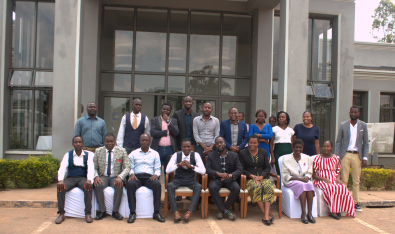PHIM Strengthens District Health Security: Cohort 24 Completes Frontline Field Epidemiology Training Programme
Lilongwe, Malawi – 7 November 2025
The Public Health Institute of Malawi (PHIM) today celebrated a major milestone in strengthening national public health systems with the graduation of Cohort 24 from the Field Epidemiology Training Programme (FETP) Frontline. A total of 18 dedicated public health and allied professionals from Chitipa District successfully completed the intensive three-month, in-service training, culminating in a scientific dissemination workshop where they presented real-world findings from their field projects.
This event marks the continuous success of the FETP, a critical workforce development initiative implemented by the Ministry of Health and Population through PHIM, with foundational financial and technical support from the United States Centres for Disease Control and Prevention (CDC) and the International Training and Education Centre for Health (I-TECH). Since its adoption in 2016, the programme has been central to building a sustainable and skilled capacity for timely detection and response to health threats across the country.
The Foundation of National Health Security
The FETP utilises a three-tier training approach—Basic (Frontline), Intermediate (nine months), and Advanced (two years)—to cultivate expertise at every level of Malawi’s health system. Cohort 24 focused on the Frontline tier, whose primary goal is to improve the quality of the Integrated Disease Surveillance and Response (IDSR) system and encourage the practical use of data for decision-making at the community and district levels.
The core principle of the FETP model is learning-by-doing: 80% of the course is dedicated to field work, where participants immediately apply classroom competencies—such as outbreak investigation, descriptive epidemiological analysis, surveillance system problem analysis, and scientific communication—to real public health challenges in their districts.
Chitipa Cohort Leads the Way in One Health Collaboration
Cohort 24 specifically targeted staff from Chitipa District Hospital, local health facilities, and, significantly, personnel from Agriculture extension Planning areas. This integrated approach is vital to strengthening One Health collaboration, recognising that the health of humans is intimately connected to the health of animals and the environment. By training staff across sectors in Chitipa, PHIM is equipping the district with the multi-disciplinary skills needed to address emerging and complex zoonotic threats effectively at the grassroots level.
Scientific Dissemination: Field Studies Driving Policy Change
The graduation ceremony was not just a formal recognition of achievement, but a crucial scientific forum. The 18 graduates presented the findings of their three-month research projects, which often lead to actionable interventions adopted by district health management teams. Health managers and heads of departments from across the country were in attendance, ensuring the immediate uptake and dissemination of these vital public health findings.

Cohort 24 graduates and mentors at the scientific dissemination workshop.
Highlights from the Scientific Presentations
Investigation of a Diarrhoea Cluster in Mbandira EPA
Investigated an acute watery diarrhoea cluster, identifying the source and at-risk populations. Findings informed targeted WASH interventions, preventing further spread.
Assessment of IDSR Data Quality for Measles in Chitipa South
Conducted a data quality audit of the measles surveillance system, identifying gaps in completeness and timeliness. Recommendations improved reporting procedures and early warning sensitivity.
Analysis of Malaria Case Trends in Agricultural Extension Planning Areas (EPA)
Analyzed five years of malaria incidence data in key EPAs, identifying seasonal and geographic hotspots. The analysis guided targeted resource allocation for ITN distribution and larviciding.
Evaluation of Routine Immunization Coverage in Rural Health Facilities
Assessed routine immunization coverage for children under two in underserved areas. The study identified access barriers, leading to the implementation of a mobile outreach clinic schedule.
Evaluation of Tuberculosis Case Reporting Timeliness
Assessed timeliness of Tuberculosis case reporting from diagnosis to national system entry. Recommended digital tools to expedite case notification and improve control measures.
Rabies Post-Exposure Prophylaxis (PEP) Availability Audit
Audited Rabies Post-Exposure Prophylaxis (PEP) availability and stock management at district health facilities. Findings ensure district readiness for animal bite incidents, reinforcing One Health collaboration.
Capacity Building: The Core Objectives Achieved
The graduation is a tangible demonstration of PHIM’s commitment to achieving the core objectives of the Frontline FETP, which include:
- Improved Data Use: Increased appreciation among public health workers for the role of data in monitoring community health and informing decisions.
- Enhanced Surveillance: Improved quality and use of surveillance data for disease and outbreak detection, strengthening the link between field epidemiology and laboratory services.
- Rapid Response: Improved capacity to investigate and respond to public health events of importance, ensuring that local outbreaks are detected and prevented from spreading within and outside the country.
Partner Acknowledgements
The continued success of the Field Epidemiology Training Programme is made possible through the robust and sustained partnership between PHIM, the Ministry of Health, and our key technical and financial partners. We extend our sincere gratitude to:
PHIM extends its heartfelt congratulations to the 18 graduates of Cohort 24 and looks forward to their continued service as frontline defenders of public health in Malawi.

Congratulations to ourselves